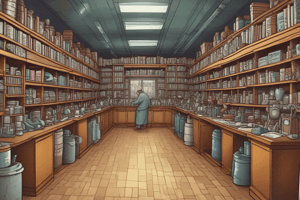Podcast
Questions and Answers
What did Thoreau argue about possessions?
What did Thoreau argue about possessions?
- Possessions are necessary for happiness
- Possessions should be shared
- Possessions lead to freedom
- Possessions are oppressive (correct)
How long did Thoreau live at Walden Pond?
How long did Thoreau live at Walden Pond?
2 years, 2 months
What does Thoreau mean by 'living free'?
What does Thoreau mean by 'living free'?
- Owning many possessions
- Conforming to societal norms
- Being one's own God (correct)
- Living close to the post office
Thoreau believes that reading is an important pursuit.
Thoreau believes that reading is an important pursuit.
What is a significant aspect of Thoreau's experience with nature?
What is a significant aspect of Thoreau's experience with nature?
What does Thoreau consider a good host?
What does Thoreau consider a good host?
What does Thoreau say about 'brute neighbors'?
What does Thoreau say about 'brute neighbors'?
What did Thoreau collect with fishermen?
What did Thoreau collect with fishermen?
What does the melting ice in spring symbolize for Thoreau?
What does the melting ice in spring symbolize for Thoreau?
What did Thoreau believe civilization to be?
What did Thoreau believe civilization to be?
Thoreau left Walden on September 6, ___.
Thoreau left Walden on September 6, ___.
Flashcards are hidden until you start studying
Study Notes
Economy
- Henry David Thoreau resided at Walden Pond for 2 years and 2 months, seeking simplicity in his lifestyle.
- Advocated that material possessions and the labor to acquire them can be oppressive and restrict freedom.
- Constructed his home gradually, borrowing tools, and completed it on July 4, emphasizing self-sufficiency with a homegrown diet.
Where I Lived and What I Lived For
- Explored various living arrangements, including a farm, but preferred to live independently and "free."
- Chose a location distant from the postal system, symbolizing freedom from societal constraints.
- Felt liberated from time’s pressures and believed in confronting life’s truths during challenging times.
Reading
- Emphasized reading as a vital pursuit of truth and intellectual growth.
- Valued ancient languages as key to interpreting texts, asserting that writing surpasses oration in impact.
- Critiqued the superficial reading habits of society, advocating for continuous education beyond the Bible and modern works.
Sounds
- Encouraged appreciation for life's subtleties alongside the act of reading.
- Living near the Fitchburg Railroad illustrated how commercialism can diminish thoughtful existence.
- Associated owls with human disenchantment and unfulfilled desires.
Solitude
- Found solace in nature, feeling a connection that transcended solitude.
- Despite isolation, he received gifts from visitors, indicating an engagement with the outside world.
- Valued the wisdom of local residents over societal norms, recognizing that loneliness can exist even in groups.
Visitors
- Welcomed companionship, always preparing three chairs for guests.
- His unconventional hosting included sharing spiritual insights rather than conventional conversation.
- Engaged with diverse individuals and identified himself as an abolitionist.
Brute Neighbors
- Documented interactions with both humans and animals, reflecting on the cycle of life through metaphorical narratives.
- Observed the behaviors of mice and other creatures, drawing parallels to human experiences.
- Identified with animals as compassionate neighbors, creating a bond through shared existence.
The Pond in Winter
- Engaged in fishing activities, fascinated by the pickerel catch and realities of the pond’s depth, approximately 100 feet.
- Challenged the notion of infinity and idealism, proposing that true depth is defined by individual behavior and circumstances.
Spring
- Described the seasonal transformation as the melting ice produces a significant sound, signaling change.
- Urged forgiveness of past grievances as a crucial aspect of renewal.
- Resumed fishing as a metaphor for life's cyclical nature and departed Walden on September 6, 1847, seeking new adventures.
Conclusion
- Asserted that personal transformation is essential for healing and growth.
- Left Walden in pursuit of new experiences and insights, advocating for the search for truth.
- Critiqued civilization as a metaphorical swamp, suggesting a stagnant state in contrast to the dynamism of self-discovery.
Studying That Suits You
Use AI to generate personalized quizzes and flashcards to suit your learning preferences.




